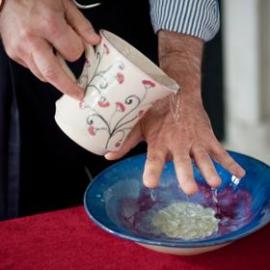by Rabbi Wendy Spears
As we approach Passover, I’ve come around again to thinking about hand-washing. When I was growing up, my family didn’t do this part of the Passover seder ritual. I didn’t learn about it until I was an undergraduate participating in a student-led seder at Hillel. At that time, it seemed to me to be a pretentious substitute for just getting up from the table and going to the sink to get our hands good and clean before eating the meal.
But hand-washing isn’t really about physical cleanliness. It’s about spiritual readiness, marking the transition from the ordinary or difficult to the realm of the spiritual. It is truly a practice of mindfulness. It’s part of Jewish culture to wash hands upon leaving a cemetery. This is where hand-washing has gained ritual power for me.
The process of ‘laving,’ the particular way of moving the water back and forth between hands so that each hand is bathed three times, requires a lot more thought and attention than a simple washing with soap under a gushing faucet. As I leave a cemetery, I take a few moments at the washing waterfall to say a blessing, bathe my hands, and read the sentence from Isaiah 25:8. This gives me some time to separate myself from the death experience and put myself in the frame of mind to drive home to my ordinary routine.
Hand-washing is most powerful to me when I’ve heard memory sharing of difficult circumstances. I recently officiated at a funeral where the deceased knew of abuse to other family members and did nothing at all to aid the victims. One of the victims revealed the story at the funeral and was validated by friends of the deceased that the information was known, and yet, the deceased felt powerless to intervene due to his own complicated relationship with the abuser.
I felt the need so strongly to wash away the immediacy of sadness. I didn’t want to forget the story, rather to not have the emotions cling to me in the moment when I needed to be able to focus on driving. Laving my hands had the immediate effect of clarifying my minds and cooling my emotions. The anger and sadness for the victims was put on hold momentarily.
No amount of washing can remove the memory of pain and suffering. And yet, it can hold the memories at bay temporarily. The beginning of the Passover story deals with the anger and sadness of bondage in Egypt. When I view the hand-washing through this lens, I can become more spiritually prepared to walk the path of the story as if it happened to me. It’s a process of being more aware of nuances in the Exodus narrative. As a participant in this narrative, I will be redeemed from that which enslaves me, that which prevents me from feeling truly free.
It’s so easy to get stuck in the ordinariness of life, to feel bound to errands, chores, paperwork, the commitments of the day to day activities. Like Shabbat is an oasis of rest in the rush of the week, so has laving my hands with water given me a small spiritual space to be mindful that there can be blessings, joy, and healing, even in the midst of pain and suffering on many levels. For this small mitzvah (a Jewish way of doing and being), I have become truly grateful.
Rabbi Wendy Spears is a community rabbi in Los Angeles. Find her at http://www.rabbiwendy.com


